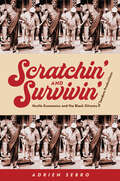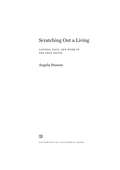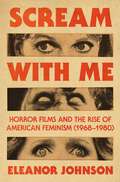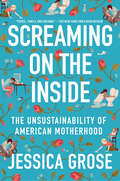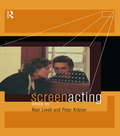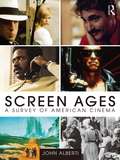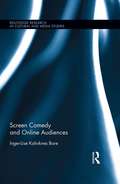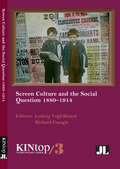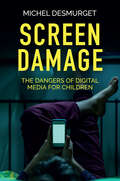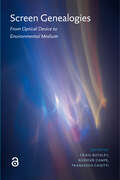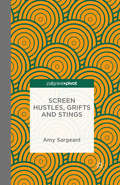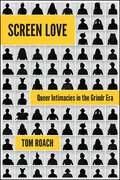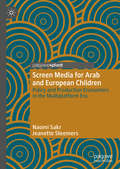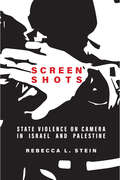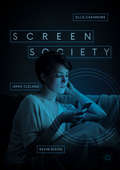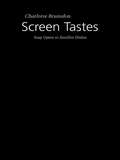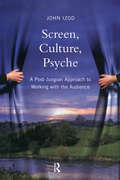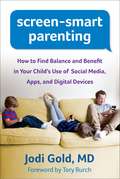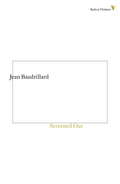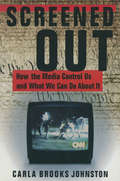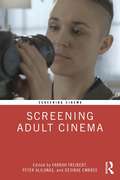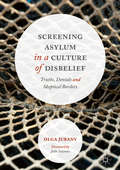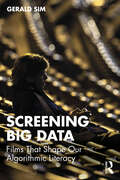- Table View
- List View
Scratchin' and Survivin': Hustle Economics and the Black Sitcoms of Tandem Productions
by Adrien SebroThe 1970s was a golden age for representations of African American life on TV sitcoms: Sanford & Son, Good Times, The Jeffersons. Surprisingly, nearly all the decade’s notable Black sitcoms were made by a single company, Tandem Productions. Founded by two white men, the successful team behind All in the Family, writer Norman Lear and director Bud Yorkin, Tandem gave unprecedented opportunities to Black actors, writers, and producers to break into the television industry. However, these Black auteurs also struggled to get the economic privileges and creative autonomy regularly granted to their white counterparts. Scratchin’ and Survivin’ discovers surprising parallels between the behind-the-scenes drama at Tandem and the plotlines that aired on their sitcoms, as both real and fictional African Americans devised various strategies for getting their fair share out of systems prone to exploiting their labor. The media scholar Adrien Sebro describes these tactics as a form of “hustle economics,” and he pays special attention to the ways that Black women—including actresses like LaWanda Page, Isabel Sanford, and Esther Rolle—had to hustle for recognition. Exploring Tandem’s complex legacy, including its hit racially mixed sitcom Diff’rent Strokes, he showcases the Black talent whose creative agency and labor resilience helped to transform the television industry.
Scratching Out a Living
by Angela StuesseHow has Latino immigration transformed the South? In what ways is the presence of these newcomers complicating efforts to organize for workplace justice? Scratching Out a Living takes readers deep into Mississippi's chicken processing plants and communities, where large numbers of Latin American migrants were recruited in the mid-1990s to labor alongside an established African American workforce in some of the most dangerous and lowest-paid jobs in the country. As America's voracious appetite for chicken has grown, so has the industry's reliance on immigrant workers, whose structural position makes them particularly vulnerable to exploitation. Based on the author's six years of collaboration with a local workers' center, this book explores how Black, white, and new Latino Mississippians have lived and understood these transformations. Activist anthropologist Angela Stuesse argues that people's racial identifications and relationships to the poultry industry prove vital to their interpretations of the changes they are experiencing. Illuminating connections between the area's long history of racial inequality, the industry's growth and drive to lower labor costs, immigrants' contested place in contemporary social relations, and workers' prospects for political mobilization, Scratching Out a Living paints a compelling ethnographic portrait of neoliberal globalization and calls for organizing strategies that bring diverse working communities together in mutual construction of a more just future.
Scream At The Sky
by Carlton StowersCarlton Stowers, the two-time Edgar Award winner and New York Times bestselling master of true crime, is back. Scream at the Sky is his masterful chronicle of one man's murderous career, and another man's sworn promise to deliver justice and closure to the people of Texas. Wichita Falls, Texas, was home to a hundred thousand people in the last months of 1984. That winter was harsh, as the normally arid Texas plains gave way to ominous dark clouds that delivered freezing sleet and rain. But a much darker force was looming, and soon the quiet town was besieged by a faceless evil-and its young women were dying because of it. In the next seventeen months five women were found brutally beaten and murdered, their young lives cut short and their bodies left haphazardly where they fell. In the years that followed, grieving families fruitlessly sought answers. A haunted district attorney chased every lead only to meet one dead end after another. And the killer's identity remained unknown to the ravaged townspeople. Then, fourteen years after the killing started, an investigator who had been assigned the cold case brought to it a renewed dedication, and came upon a chance discovery. Searching through the yellowed case files, he caught a minor detail that suggested one more suspect. Faryion Wardrip was an unhappily married family man who drowned his anger in substance abuse and violent fantasies. But for five unfortunate families, the drugs sometimes took over and the fantasies became realities. Investigator John Little followed his instincts and tirelessly ruled out every possibility until he was left with but one conclusion: Faryion Wardrip was the serial killer who had eluded his office for so long. How he tracked down Wardrip and used the legal system to beat the killer at his own game of deception is a remarkable story of justice served.
Scream with Me: Horror Films and the Rise of American Feminism (1968-1980)
by Eleanor JohnsonA LOS ANGELES TIMES MOST ANTICIPATED BOOK OF 2025 A compelling, intelligent, and timely exploration of the horror genre from one of Columbia University&’s most popular professors, shedding light on how classic horror films demonstrate larger cultural attitudes about women&’s rights, bodily autonomy, and more.In May of 2022, Columbia University&’s Dr. Eleanor Johnson watched along with her students as the Supreme Court reversed Roe v. Wade. At the same time, her class was studying the 1968 horror film Rosemary&’s Baby and Johnson had a sudden epiphany: horror cinema engages directly with the combustive politics of women&’s rights and offer a light through the darkness and an outlet to scream. With a voice as persuasive as it is insightful, Johnson reveals how classics like Rosemary&’s Baby, The Exorcist, and The Shining expose and critique issues of reproductive control, domestic violence, and patriarchal oppression. Scream with Me weaves these iconic films into the fabric of American feminism, revealing that true horror often lies not in the supernatural, but in the familiar confines of the home, exposing the deep-seated fears and realities of women&’s lives. While on the one hand a joyful celebration of seminal and beloved horror films, Scream with Me is also an unflinching and timely recognition of the power of this genre to shape and reflect cultural dialogues about gender and power.
Screaming on the Inside: The Unsustainability of American Motherhood
by Jessica Grose"If this book feels like it’s sounding the alarm on the state of American motherhood, well, that’s because it is." -- San Francisco ChronicleIn this timely and necessary book, New York Times opinion writer Jessica Grose dismantles two hundred years of unrealistic parenting expectations and empowers today’s mothers to make choices that actually serve themselves, their children, and their communitiesClose your eyes and picture the perfect mother. She is usually blonde and thin. Her roots are never showing and she installed that gleaming kitchen backsplash herself (watch her TikTok for DIY tips). She seamlessly melds work, wellness and home; and during the depths of the pandemic, she also ran remote school and woke up at 5 a.m. to meditate.You may read this and think it’s bananas; you have probably internalized much of it.Journalist Jessica Grose sure had. After she failed to meet every one of her own expectations for her first pregnancy, she devoted her career to revealing how morally bankrupt so many of these ideas and pressures are. Now, in Screaming on the Inside, Grose weaves together her personal journey with scientific, historical, and contemporary reporting to be the voice for American parents she wishes she’d had a decade ago.The truth is that parenting cannot follow a recipe; there’s no foolproof set of rules that will result in a perfectly adjusted child. Every parent has different values, and we will have different ideas about how to pass those values along to our children. What successful parenting has in common, regardless of culture or community, is close observation of the kind of unique humans our children are. In thoughtful and revelatory chapters about pregnancy, identity, work, social media, and the crisis of the Covid-19 pandemic, Grose explains how we got to this moment, why the current state of expectations on mothers is wholly unsustainable, and how we can move towards something better.
Screen Acting
by Alan Lovell Peter KrämerWhile not everyone would agree with Alfred Hitchcock's notorious remark that 'actors are cattle', there is little understanding of the work film actors do. Yet audience enthusiasm for, or dislike of, actors and their style of performance is a crucial part of the film-going experience. Screen Acting discusses the development of film acting, from the stylisation of the silent era, through the naturalism of Lee Strasberg's 'Method', to Mike Leigh's use of improvisation.The contributors to this innovative volume explore the philosophies which have influenced acting in the movies and analyse the styles and techniques of individual filmmakers and performers, including Bette Davis, James Mason, Susan Sarandon and Morgan Freeman. There are also interviews with working actors: Ian Richardson discusses the relationship between theatre, film and television acting; Claire Rushbrook and Ron Cook discuss theri work with Mike Leigh, and Helen Shaver discusses her work with the critic Susan Knobloch.
Screen Ages: A Survey of American Cinema
by John AlbertiScreen Ages is a valuable guide for students exploring the complex and vibrant history of US cinema and showing how this film culture has grown, changed and developed. Covering key periods from across American cinema history, John Alberti explores the social, technological and political forces that have shaped cinematic output and the varied impacts cinema of on US society. Each chapter has a series of illuminating key features, including: ‘Now Playing’, focusing on films as cinematic events, from The Birth of a Nation to Gone with the Wind to Titanic, to place the reader in the social context of those viewing the films for the first time ‘In Development’, exploring changing genres, from the melodrama to the contemporary super hero movies, ‘The Names Above and Below the Title’, portraying the impact and legacy of central figures, including Florence Lawrence, Orson Welles and Wes Anderson Case studies, analyzing key elements of films in more depth Glossary terms featured throughout the text, to aid non-specialist students and expand the readers understanding of changing screen cultures. Screen Ages illustrates how the history of US cinema has always been and continues to be one of multiple screens, audiences, venues, and markets. It is an essential text for all those wanting to understand of power of American cinema throughout history and the challenges for its future. The book is also supported by a companion website, featuring additional case studies, an interactive blog, a quiz bank for each chapter and an online chapter, ‘Screen Ages Today’ that will be updated to discuss the latest developments in American cinema.
Screen Comedy and Online Audiences (Routledge Research in Cultural and Media Studies)
by Inger-Lise Kalviknes BoreThe question of why we laugh (or don't laugh) has intrigued scholars since antiquity. This book contributes to that debate by exploring how we evaluate screen comedy. What kinds of criteria do we use to judge films and TV shows that are meant to be funny? And what might that have to do with our social and cultural backgrounds, or with wider cultural ideas about film, TV, comedy, quality and entertainment? The book examines these questions through a study of audience responses posted to online facilities such as Twitter, Facebook, review sites, blogs and message boards. Bore’s analysis of these responses considers a broad range of issues, including how audiences perceive the idea of "national" comedy; what they think of female comedians; how they evaluate romcoms, sitcoms and web comedy; what they think is acceptable to joke about; what comedy fans get excited about; how fans interact with star comedians; and what comedy viewers really despise. The book demonstrates some of the ways in which we can adapt theories of humour and comedy to examine the practices of contemporary screen audiences, while offering new insights into how they negotiate the opportunities and constrictions of different online facilities to share their views and experiences.
Screen Culture and the Social Question, 1880–1914 (KINtop #3)
by Ludwig Vogl-Bienek and Richard CrangleEssays exploring how reformers and charities used the “magic lantern” to raise public awareness of poverty.Public performances using the magic or optical lantern became a prominent part of the social fabric of the late nineteenth century. Drawing on a rich variety of primary sources, Screen Culture and the Social Question, 1880-1914 investigates how the magic lantern and cinematograph, used at public lectures, church services, and electoral campaigns, became agents of social change.The essays examine how social reformers and charitable organizations used the “art of projection” to raise public awareness of the living conditions of the poor and the destitute, as they argued for reform and encouraged audiences to work to better their lot and that of others.
Screen Damage: The Dangers of Digital Media for Children
by Michel DesmurgetAll forms of recreational digital consumption – whether on smartphones, tablets, game consoles or TVs – have skyrocketed in the younger generations. From the age of 2, children in the West clock up more than 2.5 hours of screen time a day; by the time they reach 13, it&’s more than 7 hours a day. Added up over the first 18 years of life, this is the equivalent of almost 30 school years, or 15 years of full-time employment. Most media experts do not seem overly concerned about this situation: children are adaptable, they say, they are &‘digital natives&’, their brains have changed and screens make them smarter. But other specialists – including some paediatricians, psychiatrists, teachers and speech therapists – dispute these claims, and many parents worry about the long-term consequences of their children&’s intensive exposure to screens. Michel Desmurget, a leading neuroscientist, has carefully weighed up the scientific evidence concerning the impact of the digital activities of our children and adolescents, and his assessment does not make for happy reading: he shows that these activities have significant detrimental consequences in terms of the health, behaviour and intellectual abilities of young people, and strongly affect their academic outcomes. A wake-up call for anyone concerned about the long-term impacts of our children&’s over-exposure to screens.
Screen Genealogies: From Optical Device to Environmental Medium (MediaMatters)
by Francesco Casetti Craig Buckley Rüdiger CampeAgainst the grain of the growing literature on screens, Screen Genealogies argues that the present excess of screens cannot be understood as an expansion and multiplication of the movie screen nor of the video display. Rather, screens continually exceed the optical histories in which they are most commonly inscribed. As contemporary screens become increasingly decomposed into a distributed field of technologically interconnected surfaces and interfaces, we more readily recognize the deeper spatial and environmental interventions that have long been a property of screens. For most of its history, a screen was a filter, a divide, a shelter, or a camouflage. A genealogy stressing transformation and descent rather than origins and roots emphasizes a deeper set of intersecting and competing definitions of the screen, enabling new thinking about what the screen might yet become.
Screen Hustles, Grifts and Stings: Stings, Grifts, Hustles and the Long Con
by A. SargeantScreen Hustles, Grifts and Stings identifies recurrent themes and techniques of the con film, suggests precedents in literature and discusses the perennial appeal of the con man for readers and viewers alike. Core studies span from film (Catch Me If You Can, Paper Moon, House of Games) to television (Hustle), from Noir (The Grifters) to Romantic Comedy (Gambit). Frequently, the execution of the con is only finely distinguishable from the conduct of a legitimate profession and, challengingly, a mark is often shown to be culpable in his or her undoing. The best con films, it is suggested, invite re-watching and reward the viewer accordingly: who is complicit and when? How and where is the con achieved? When is the viewer party to the con? And what, if any, moral is to be drawn?
Screen Love: Queer Intimacies in the Grindr Era
by Tom RoachIn work, play, education, and even healthcare, we are using social media during COVID-19 to approximate "normal life" before the pandemic. In Screen Love, Tom Roach urges us to do the opposite. Rather than highlight the ways that social media might help reproduce the pre-pandemic status quo, Roach explores how Grindr and other dating/hookup apps can help us envision a radically new normal: specifically, antinormative conceptions of selfhood and community. Although these media are steeped in neoliberal relational and communicative norms, they offer opportunities to reconceive subjectivity and ethics in ways that defy normative psychological and sexual paradigms. In the virtual cruise, Roach argues, we might experience a queer sociability in which participants are formally interchangeable avatar-objects. On Grindr and other m4m platforms, a model of selfhood championed in liberal-humanist traditions—an intelligent, altruistic, eloquent, and emotionally expressive self—is often a liability. By teasing out the queer ethical and political potential of an antisocial, virtual fungibility, Roach compels readers to think twice about media typically dismissed as sordid, superficial, and narcissistic. Written for students, professors, and nonacademics alike, Screen Love is an accessible, provocative, and at times subversively funny read.
Screen Media for Arab and European Children: Policy and Production Encounters in the Multiplatform Era
by Jeanette Steemers Naomi SakrThis book addresses gaps in our understanding of processes that underpin the making and circulation of children's screen contents across the Arab region and Europe. Taking account of recent disruptive shifts in geopolitics that call for new thinking about how children’s media policy and production should proceed after large-scale forced migration in both regions, the book asks to what extent children in Europe and the Arab World are engaging with the same content. Who is funding new content and who is making it, according to whose criteria? Whose voices are loudest when it comes to pressures for regulation of children’s screen content, and what exactly do they want? The answers to these questions matter for anyone seeking insights into diverse cross-cultural collaborations and content innovations that are shaping new investment and production relationships.
Screen Shots: State Violence on Camera in Israel and Palestine (Stanford Studies in Middle Eastern and Islamic Societies and Cultures)
by Rebecca L. SteinIn the last two decades, amid the global spread of smartphones, state killings of civilians have increasingly been captured on the cameras of both bystanders and police. Screen Shots studies this phenomenon from the vantage point of the Israeli occupation of Palestinian territories. Here, cameras have proliferated as political tools in the hands of a broad range of actors and institutions, including Palestinian activists, Israeli soldiers, Jewish settlers, and human rights workers. All trained their lens on Israeli state violence, propelled by a shared dream: that advances in digital photography—closer, sharper, faster—would advance their respective political agendas. Most would be let down. Drawing on ethnographic work, Rebecca L. Stein chronicles Palestinian video-activists seeking justice, Israeli soldiers laboring to perfect the military's image, and Zionist conspiracy theorists accusing Palestinians of "playing dead." Writing against techno-optimism, Stein investigates what camera dreams and disillusionment across these political divides reveal about the Israeli and Palestinian colonial present, and the shifting terms of power and struggle in the smartphone age.
Screen Society
by Ellis Cashmore Jamie Cleland Kevin DixonScreens have been with us since the eighteenth century, though we became accustomed to staring at them only after the appearance of film and television in the twentieth century. But there was nothing in film or TV that prepared us for the revolution wrought by the combination of screens and the internet. Society has been transformed and this book asks how and with what consequences?Screen Society’s conclusions are based on an original research project conducted by scholars in the UK and Australia. The researchers designed their own research platform and elicited the thoughts and opinions of nearly 2000 participants, to draw together insights of today’s society as seen by users of smartphones, tablets and computers – what the authors call Screenagers. The book issues challenges to accepted wisdom on many of the so-called problems associated with our persistent use of screen devices, including screen addiction, trolling, gaming and gambling.
Screen Tastes: Soap Opera to Satellite Dishes
by Charlotte BrunsdonCharlotte Brundson's key writings on film and television are bought together with new introductions which contextualise and update the arguments. The focus is on the tastes and pleasures of the female consumer as she is produced by popular film and television.
Screen, Culture, Psyche: A Post Jungian Approach to Working with the Audience
by John IzodScreen, Culture, Psyche illuminates recent developments in Jungian modes of media analysis, and illustrates how psychoanalytic theories have been adapted to allow for the interpretation of films and television programmes, employing Post-Jungian methods in the deep reading of a whole range of films. Readings of this kind can demonstrate the way that some films bear the psychological projections not only of their makers but of their audience, and assess the manner in which films engage the writer’s own psyche. Seeking to go beyond existing theories, John Izod explores the question of whether Jungian screen analysis can work for ordinary filmgoers - can what functions for the scholar be said to be true for people without a background in Jung’s ideas? Through detailed readings of a number of films and programmes, John Izod builds on the work previously done by Jungian film analysts, and moves on to contemplate the level of audience engagement. Offering deep readings of films directed by Kubrick and Bernardo Bertolucci, as well as satirical comedy, documentaries and twenty-first century Westerns, the book explores the extent to which they manage to make the psychological impact on spectators that films of a similar kind have done on Jungian writers. The author concludes that the screen texts with the best likelihood of impacting the culture of the audience through their collective psychological force fall at opposite ends of the size and budget range: highly personal documentaries, and the most affecting of mainstream genre movies. This innovative text will be essential reading for psychoanalysts and therapists, as well as students and scholars of film with an interest in understanding how screen products work psychologically to engage the viewer.
Screen-Smart Parenting
by Tory Burch Jodi GoldAs a practicing child psychiatrist and mother of three, Jodi Gold has a unique understanding of both the mind-boggling benefits and the serious downsides of technology. Dr. Gold weaves together scientific knowledge and everyday practical advice to help you foster your child's healthy relationship to technology, from birth to the teen years. You'll learn: *How much screen time is too much at different ages. *What your kids and teens are actually doing in all those hours online. *How technology affects social, emotional, and cognitive development. *Which apps and games build smarts and let creativity shine. *How your own media habits influence your children. *What you need to know about privacy concerns, cyberbullying, and other dangers. *Ways to set limits that the whole family can live with.
Screened Out
by Jean Baudrillard Chris Turner'Watching the president's Christmas message produces this necropolar, white-mass sensation. Seeing the video broadcast of the Christmas service in the cathedral itself, with these pathetic screens and the young worshippers slumped around them here and there, you tell yourself that God and religion deserved better. Deserved to die, yes, but not this. However, watching the presidential figure and his sonorous inanity, you tell yourself that here at least you got what you deserved. Chirac is useless - that goes without saying - but so are we all ... Uselessness of this kind has no origin: it exists immediately, reciprocally; like a shared secret, you savour it implicitly - with its warm bitterness - particularly in these cold snaps, as the very essence of the social bond. Sanctioned by that other interactive uselessness - the uselessness of the screen.'World-renowned for his lively and often iconoclastic reading of contemporary culture and thought, Jean Baudrillard here turns his hand to topical political debates and issues. In this stimulating collection of journalistic essays Baudrillard addresses subjects ranging from those already established as his trademark (virtual reality, Disney, television) to more unusual topics such as the Western intervention in Bosnia, children's rights, Holocaust revisionism, AIDS, the Rushdie fatwa, Formula One racing, mad cow disease, genetic cloning, and the uselessness of Chirac. These are coruscating and intriguing articles, not least because they show that Baudrillard is - pace his critics - still susceptible and alert to influences from social movements and the world beyond the hyperreal.
Screened Out: How the Media Control Us and What We Can Do About it
by Carla B. JohnstonA comparison of the cultural and political/institutional dimensions of war's impact on Greece during the Peloponnesian War, and the United States and the two Koreas, North and South, during the Korean War. It demonstrates the many underlying similarities between the two wars.
Screened Out: Playing Gay in Hollywood from Edison to Stonewall
by Richard BarriosRapacious dykes, self-loathing closet cases, hustlers, ambiguous sophisticates, and sadomasochistic rich kids: most of what America thought it knew about gay people it learned at the movies. A fresh and revelatory look at sexuality in the Great Age of movie making, Screened Out shows how much gay and lesbian lives have shaped the Big Screen. Spanning popular American cinema from the 1900s until today, distinguished film historian Richard Barrios presents a rich, compulsively readable analysis of how Hollywood has used and depicted gays and the mixed signals it has given us: Marlene in a top hat, Cary Grant in a negligee, a pansy cowboy in The Dude Wrangler. Such iconoclastic images, Barrios argues, send powerful messages about tragedy and obsession, but also about freedom and compassion, even empowerment.Mining studio records, scripts, drafts (including cut scenes), censor notes, reviews, and recollections of viewers, Barrios paints our fullest picture yet of how gays and lesbians were portrayed by the dream factory, warning that we shouldn't congratulate ourselves quite so much on the progress movies - and the real world -- have made since Stonewall.Captivating, myth-breaking, and funny, Screened Out is for all film aficionados and for anyone who has sat in a dark movie theater and drawn strength and a sense of identity from what they saw on screen, no matter how fleeting or coded.
Screening Adult Cinema (Screening Cinema)
by Peter Alilunas Farrah Freibert Desirae EmbreeThis collection of 39 original essays is designed to support film screenings. Each chapter focuses on a single adult film—a category broadly construed as films that foreground sex as a primary narrative, aesthetic, or marketing element. The chapters draw on a variety of perspectives, contexts, histories, themes, and politics in examinations of style, genre, authorship, performance, and stardom.The first of its kind, Screening Adult Cinema brings together a broad range of established scholars alongside new voices to demonstrate the global breadth and diversity of adult cinema, from a variety of time periods and transnational contexts, paying particular attention to regions and films that have been underrepresented within existing adult film scholarship. Following the Screening Cinema series, Screening Adult Cinema is intended as a teaching text and reference for courses in which film screenings are a core activity, while also appealing to adult film scholars.This unique collection will be invaluable for courses on adult or exploitation film history, feminist film studies, global queer cinema, and porn studies. It will also be useful for general courses in media studies with a focus on gender, sex, and sexuality.
Screening Asylum in a Culture of Disbelief: Truths, Denials and Skeptical Borders
by Olga JubanyThis ethnographic book enhances our understanding of asylum screening, an area of immigration that is often overlooked and remains under-researched. Falsely perceived as a one-dimensional function of static state power, it is here revealed that asylum decisions at borders respond to a complex cultural construction, saturated by a meta-message of disbelief, denial and moral panics. The author demonstrates that immigration officers’ work patterns, behavior and decisions are informed by such stereotyping, which has led to asylum narratives being interpreted in the light of concepts of social acceptability and rejection. Establishing a parallel with law enforcement, the author argues that this process replicates a professional world of categorization and control, forged within an autonomous immigration service subculture. This timely work will appeal to students and scholars of migration studies, identity and ethnic studies, social anthropology, sociology, law and policy studies.>
Screening Big Data: Films That Shape Our Algorithmic Literacy
by Gerald SimThis book examines the influence of key films on public understanding of big data and the algorithmic systems that structure our digitally mediated lives.From star-powered blockbusters to civic-minded documentaries positioned to facilitate weighty debates about artificial intelligence, these texts frame our discourse and mediate our relationship to technology. Above all, they impact society’s abilities to regulate AI and navigate big tech’s political and economic maneuvers to achieve market dominance and regulatory capture. Foregrounding data politics with close readings of key films like Moneyball, Minority Report, The Social Dilemma, and Coded Bias, Gerald Sim reveals compelling ways in which films and tech industry–adjacent media define apprehension of AI. With the mid-2010s techlash in danger of fizzling out, Screening Big Data explores the relationship between this resistance and cultural infrastructure while highlighting the urgent need to refocus attention onto how technocentric media occupy the public imagination.This book will interest students and scholars of film and media studies, digital culture, critical data studies, and technopolitics.
